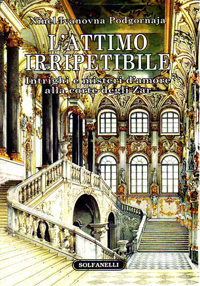 |
Ninel Ivanovna Podgornaja
The unrepeatable moment
(Solfanelli Editore- Chieti)
Italian version by
Alfredo Bertollo & Pier Luigi Coda |
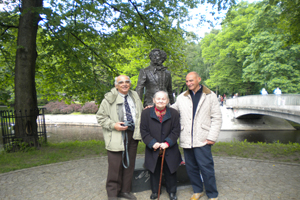
Alfredo Bertollo,Ninel Podgornaja, Pier Luigi Coda
at Riga under the monument of Puškin |
"The unrepeatable moment" concludes the triptych of works of Russian writer Ninel Podgornaja published and translated for the first time in Italian by the publisher Solfanelli. It was a path-literary biography began with "Mafalda of Savoy-Hesse", continued with "Pushkin and the Baltics" and now with this complete overview of historical profiles of women who have crossed the intriguing, sometimes troubled, turbulent peeking inside the walls of the imperial courts of the Tsars of Russia.
The merit of having discovered and brought to Italy the Podgornaja must be attributed, no doubt, to Alfredo Bertollo that, in his commendable activities of keen observer of Russian literary movements in the most cultured and authentic expressions, sensed the original value of a courageous writer who deserves to be appreciated abroad beyond the borders of his nation.
|
Very strange and curious life the story of Podgornaja, born into a family of strict Marxist-Leninist (his name Ninel is an anagram of Lenin) was a young activist in the communist regime to distribute advertising material that Western sailors docked in the port of Odessa. She moved to Riga also for climatic reasons ("Odessa was too hot," she says), and she distinguished herself for her work as a journalist and get a permanent live broadcast focusing on Pushkin, transmitted by the state television channels. Her love of Art, History and Poetry will bring her to spending much of her income in the foundation of "Pushkin Museum and the Baltic States" which she leads for several years, enriching it with documents, artifacts and iconography that she has discovered with her fieldwork.
|
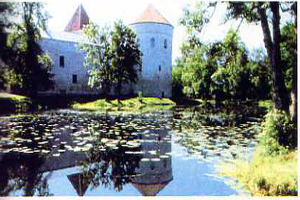
Lode - the Castle |
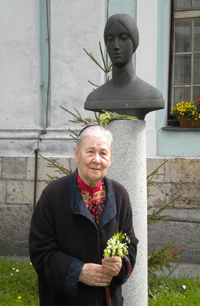
N.Podgornaja pays triburte to Anna Kern at Riga |
And it is the love of Art, History and Poetry, which will shake her soul, her ideological convictions that spurred her to discover the veil that surrounds the "forbidden", the "choking" of tsarist Russia, canceled by Bolshevik revolution in the blood of the massacre in Yekaterinburg on 17 July 1918. It was not easy, in sifting through those cards there was the risk to be banned even in Siberia. But Podgornaja was not a kind to be impressed, she had already challenged the regime (however without any success) by opposing to the demolition in Riga of the house of Anna Kern, the great love of Pushkin.
|
With dogged persistence, Podgornaja doesn’t want to give up the dream to weave, as a grand tapestry of biographies, a documented pilgrimage in the lives of the ladies awarded the Cross of Santa Catherine, the only award that Imperial Russia attributed to women. Her historical research continues with great difficulty, the available material is scarce, difficult to access, jealously guarded in the secret state archives. The danger of getting caught is a constant, invisible threat.
|

Koluvere - Tomb of the House of Württemberg |

Castle "Solitude" in Württemberg |
When the Soviet regime finally falls apart, everything seems to become easier. Many of the heroines that interested the author had had relations with the West, especially with the Germanic countries. All what she could do it was to travel and go to retrieve news, images, and documents missing. The curious mind of the journalist always had the upper hand over. The meeting with the Landgrave Maurice of Hesse and the visit to the castle of Wolfsgarten, which is described in the chapter " Wonderful Hesse ", besides being a testimony that certainly goes well beyond the history of memoirs, is a prime example of her know how to fall into the profiles and the events of the past to extrapolate the most secret authenticity of the contours.
|
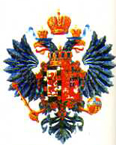
Romanov: coat of arms
|
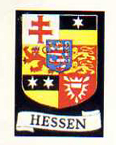
Hessen: coat of arms
|
|

